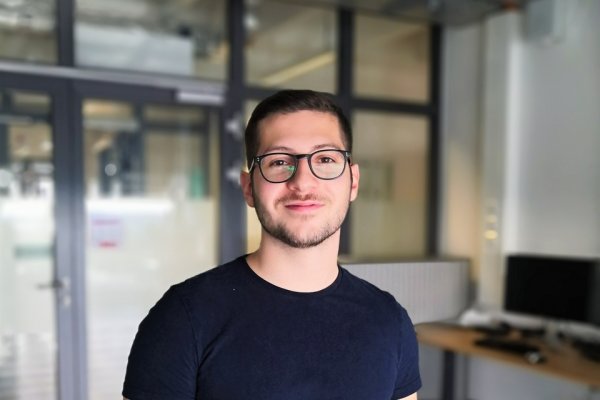29.08.2022

On our new format "Level UP“, we would like to present particularly good and exciting final theses of our students, and thus offer a stage to their good achievements.
Our first final year student is Philippe Piras. He is a student assistant at our chair and recently finished his bachelor thesis with Benedikt Faltin and Prof. Markus König his bachelor thesis on the topic: " Best Practice: Scanning and Modeling for Civil Engineering Structures in Infrastructure Construction".
In terms of content, the best methods for as-built surveying were first determined on the basis of a literature search. Based on this, Philippe conducted three expert interviews on the topic of laser scanning for as-built surveys, each with a surveyor, a modeler and a professor who covered the theoretical aspect. These results were then translated into a best practice example and prototyped by Philippe on a bridge in the Unicenter.
What was working well?
Philippe: The work with the laser scanner for scanning the bridge worked particularly well because I had already worked with it frequently in advance due to my work at the chair. So I knew what to look out for. Finding appointments with the individual experts for the interviews also worked very well. The fact that I was supported in making contact also helped me a lot.
What was difficult?
Philippe: Working with LaTeX was especially difficult for me at the beginning, because I had never used it before. Sometimes, when I wanted to change something in the template, the program reacted quite differently than intended. It took me a while to get used to it. Apart from that, self-organization is also something you have to learn quickly, as I was two weeks behind my own schedule in the meantime. But I was able to work that out again in the end. Looking back, I would have liked to start a little earlier so that it would have been more relaxed towards the end. But I think that's what they always say.
Do you have any tips for other graduates?
Philippe: Yes, I think that's really the tip that everyone always mentions: Start on time. You should set yourself a good schedule, where you also have 1-2 weeks planned in as a buffer. Otherwise it gets pretty tight towards the end, as I found out. I would do that better next time. The two weeks at the end for the corrections are also important. Especially if other people are to read over it. Furthermore, I also think that the consultation with the supervising persons is important. You should clarify what the mutual expectations are, especially if you don't know each other yet. Reading a few written pages back to back can also be very helpful, so that you can make changes early on.
On our new format "Level UP“, we would like to present particularly good and exciting final theses of our students, and thus offer a stage to their good achievements.
Our first final year student is Philippe Piras. He is a student assistant at our chair and recently finished his bachelor thesis with Benedikt Faltin and Prof. Markus König his bachelor thesis on the topic: " Best Practice: Scanning and Modeling for Civil Engineering Structures in Infrastructure Construction".
In terms of content, the best methods for as-built surveying were first determined on the basis of a literature search. Based on this, Philippe conducted three expert interviews on the topic of laser scanning for as-built surveys, each with a surveyor, a modeler and a professor who covered the theoretical aspect. These results were then translated into a best practice example and prototyped by Philippe on a bridge in the Unicenter.
What was working well?
Philippe: The work with the laser scanner for scanning the bridge worked particularly well because I had already worked with it frequently in advance due to my work at the chair. So I knew what to look out for. Finding appointments with the individual experts for the interviews also worked very well. The fact that I was supported in making contact also helped me a lot.
What was difficult?
Philippe: Working with LaTeX was especially difficult for me at the beginning, because I had never used it before. Sometimes, when I wanted to change something in the template, the program reacted quite differently than intended. It took me a while to get used to it. Apart from that, self-organization is also something you have to learn quickly, as I was two weeks behind my own schedule in the meantime. But I was able to work that out again in the end. Looking back, I would have liked to start a little earlier so that it would have been more relaxed towards the end. But I think that's what they always say.
Do you have any tips for other graduates?
Philippe: Yes, I think that's really the tip that everyone always mentions: Start on time. You should set yourself a good schedule, where you also have 1-2 weeks planned in as a buffer. Otherwise it gets pretty tight towards the end, as I found out. I would do that better next time. The two weeks at the end for the corrections are also important. Especially if other people are to read over it. Furthermore, I also think that the consultation with the supervising persons is important. You should clarify what the mutual expectations are, especially if you don't know each other yet. Reading a few written pages back to back can also be very helpful, so that you can make changes early on.